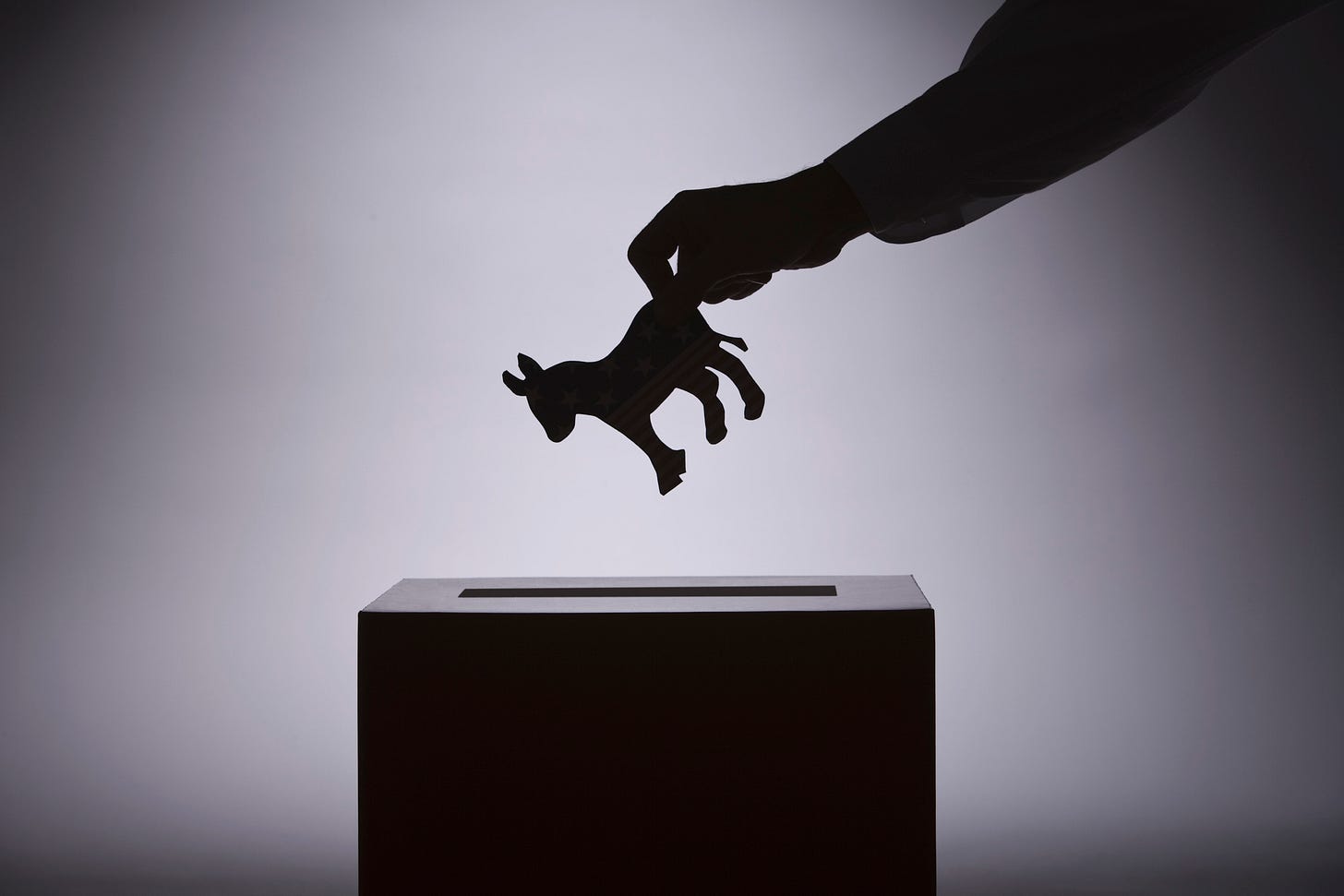Democrats’ Democratic Problem
Despite its name, the Democratic Party doesn’t seem very devoted to the idea of democracy these days

“Is democracy still America’s sacred cause?” Joe Biden asked in January. “That’s what the 2024 election is all about.” It’s a question that Biden might as well pose to his own party—and he won’t like the answer. His party’s presidential nomination was the least democratic process in living memory.
The president had delivered the same message for three years, each time with a few more stumbles and mumbles. But don’t believe your eyes and ears, his campaign assured us. Biden is the very model of mental sharpness and physical stamina.
Less than month after it officially began, the front-loaded Democratic presidential primary was all but over. With little discussion, no debates and only two small states voting, an unpopular incumbent was locked in for November. Well, at least as far as voters were concerned.
This, of course, was by design, compressing what was once a months-long process into a few weeks. New Hampshire and Iowa held this cycle’s votes in January, while most other states required candidates to register by the first week of that month. Front-loading may help avoid protracted battles, but it silences voters in the other 48 states. When Democratic party bosses had to choose between the people and themselves, they chose the latter.
If any unforeseen event occurs within 10 months of Election Day—say, an obvious lack of mental sharpness and physical stamina—voters are forbidden from choosing a new candidate. Rather, party bosses make that decision behind closed doors, as we witnessed last weekend. Within hours of Joe Biden’s Sunday afternoon announcement that he was abandoning his pursuit of reelection, high-level Democrats lined up behind his vice president, Kamala Harris. By Tuesday evening, 93% of Democratic members of Congress, 96% of the party’s senators and a full 100% of its governors had publicly backed Harris for the presidential nomination.
None of this seems very democratic.
The late call to swap Biden with Harris hasn’t a hint of democracy, but was instead decided by elites in vape-filled rooms. For her own part, Harris hasn’t been embraced by average Americans. In fact, presidential candidate Harris in 2020 proved so unpopular she was forced to drop out before a single vote was cast. Her current approval rating remains underwater by double digits, so any argument that Harris was chosen for her appeal to the general public will fall flat.
Despite their name, the Democratic Party regularly subverts the democratic process with their win-at-all-costs tactics. In the 2022 midterms, it poured money into state and local races to promote the furthest-right candidates in Republican primaries—in the hopes that propping up far-right candidates in their primaries would make for more winnable general elections for Democrats. The Washington Post reported an investment of nearly $19 million across 12 races, which doesn’t include the $9.5 million from Illinois Gov. J.B. Pritzker (who’s on Harris’ shortlist for VP) or the $25 million from the Democratic Governors Association spent on the state’s Republican gubernatorial primary. (Partly thanks to this infusion of cash into the race, far-right Illinois State Senator Darren Bailey won the Republican primary—and was then soundly defeated by Pritzker in the general election.)
This helped stanch the midterm bleeding, but even Democrats admitted the blatant hypocrisy. Former Indiana Rep. Tim Roemer claimed the project “risks elevating these liars and giving them a platform for another three or four months—even if they end up getting beat—to drumbeat their message into the electorate and further erode trust.”
“It undermines our arguments about the very real democracy threat,” Democratic strategist Tré Easton said, “when we spend Democratic dollars bolstering people hostile to democracy.”
Easton never realized the people “hostile to democracy” were the Democrats themselves.
We’ve also witnessed countless cases in which losing Democratic candidates denounce or even refuse to accept the results of free and fair elections. Hillary Clinton claimed the 2016 election was “stolen” and called Donald Trump an “illegitimate president.” Georgia gubernatorial candidate Stacey Abrams refused to concede her failed 2018 race, for which she was lionized by her party and most of the media.
Harry Reid, the late Senate minority leader, lied about then-presidential nominee Mitt Romney paying no taxes for 10 years. When asked for an apology, Reid laughed it off. “Romney didn’t win, did he?” It’s hardly a wonder Americans have lost faith in the entire process.
Despite their rhetoric claiming democracy is “America’s sacred cause,” the Democratic Party’s actions reveal their willingness to destroy democracy in order to save it. The 2024 election is less about “one person, one vote” than a play for power at all costs.



